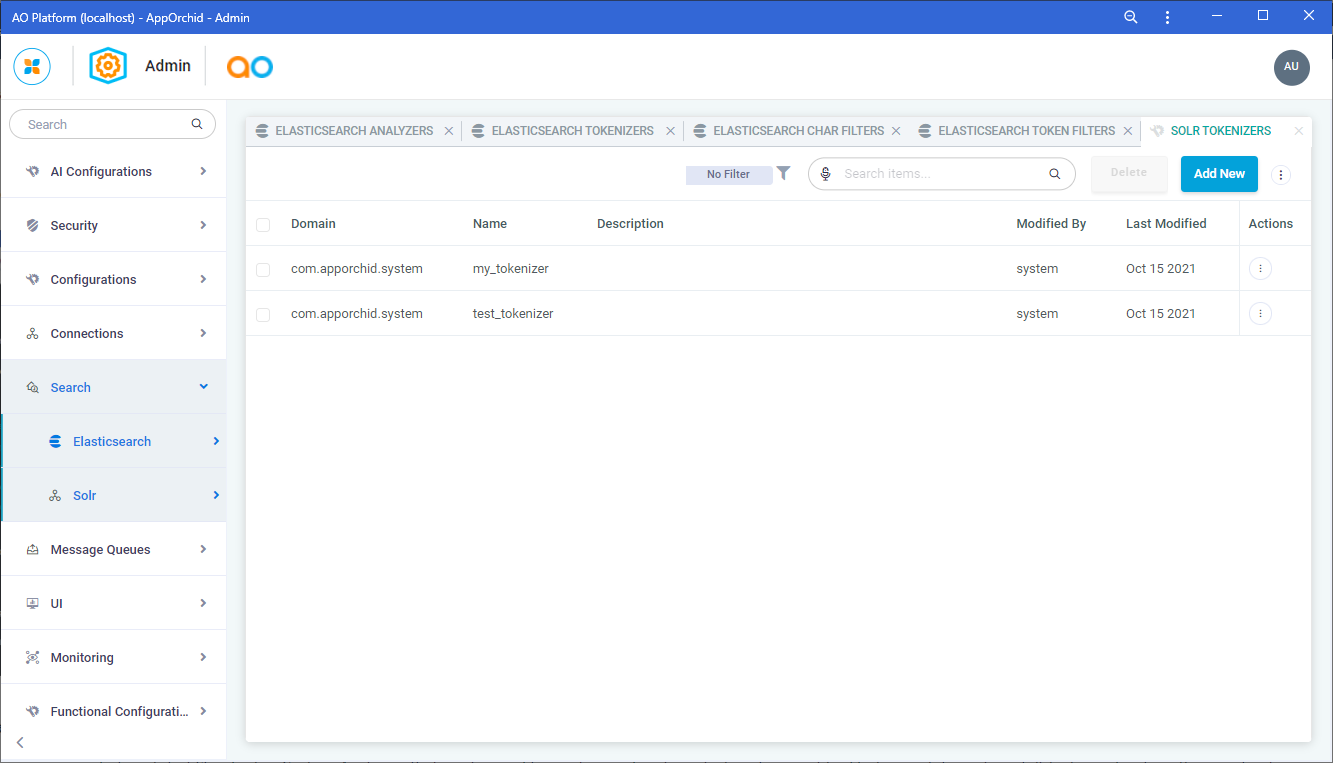Admin > Search
Intended audience: DEVELOPERS ADMINISTRATORS
AO Platform: 4.3
Overview
The Search pages enable users to configure options specific to Elasticsearch and Solr integration.
Most of the pages in this section offer the following general actions:
Search/Filter - use a search term to find an entry from existing configurations.
Delete - batch deletion of any/all selected items.
Add New - create a new entry on the page.
Refresh - refreshes the page.
Import from Excel - allows the provision to import the configuration of one or more entries of the selected configuration page.
Export as CSV - exports the content of the page to a CSV file.
Settings - allows configuration of which columns can be seen on the page.
Go to (or select by page number) - allows moving to another page in case of too many entries for one page.
Additionally, these are the actions on individual entries:
View - views the properties of an entry in read-only mode.
Edit - allows the properties of an entry to be edited.
Delete - deletes an entry.
Add to Transport - adds the configuration record to Transport.

Elasticsearch > Analyzers
The Analyzers page includes a list of Standard or Custom Analyzers that can be used to create search indices. Text analysis enables Elasticsearch to perform full-text search, where the search returns all relevant results rather than just exact matches.
For a full Analyzer reference for Elasticsearch, see https://www.elastic.co/guide/en/elasticsearch/reference/current/analysis-analyzers.html.
Configuration details include Properties for these categories: General and Analyzer.
Elasticsearch > Tokenizers
The Tokenizers page includes a list of Standard or Custom Tokenizers.
A Tokenizer receives a stream of characters, breaks it up into individual tokens (usually individual words), and outputs a stream of tokens. For instance, a whitespace tokenizer breaks text into tokens whenever it sees any whitespace. It would convert the text "Quick brown fox!" into the terms [Quick, brown, fox!].
The Tokenizer is also responsible for recording the following:
Order or position of each term (used for phrase and word proximity queries)
Start and end character offsets of the original word which the term represents (used for highlighting search snippets).
Token type, a classification of each term produced, such as
<ALPHANUM>,<HANGUL>, or<NUM>. Simpler analyzers only produce thewordtoken type.
For a full Tokenizer reference for Elasticsearch, see https://www.elastic.co/guide/en/elasticsearch/reference/current/analysis-tokenizers.html.
Configuration details include Properties for these categories: General, Tokenizer, and Additional Properties.
Elasticsearch > Character Filters
The Character Filters page includes a list of Standard or Custom Character Filters.
Character Filters are used to preprocess the stream of characters before it is passed to the tokenizer.
A Character Filter receives the original text as a stream of characters and can transform the stream by adding, removing, or changing characters. For instance, a character filter could be used to convert Hindu-Arabic numerals (٠١٢٣٤٥٦٧٨٩) into their Arabic-Latin equivalents (0123456789), or to strip HTML elements like <b> from the stream.
For a full Character Filters reference for Elasticsearch, see https://www.elastic.co/guide/en/elasticsearch/reference/current/analysis-charfilters.html.
Configuration details include Properties for these categories: General, Char Filter, and Additional Properties.
Elasticsearch > Token Filters
The Token Filters page includes a list of Standard or Custom Token Filters.
Token Filters accept a stream of tokens from a tokenizer and can modify tokens (eg lowercasing), delete tokens (eg remove stopwords) or add tokens (eg synonyms).
For a full Token Filters reference for Elasticsearch, see https://www.elastic.co/guide/en/elasticsearch/reference/current/analysis-tokenfilters.html.
Configuration details include Properties for these categories: General, Token Filter, and Additional Properties.
Solr > Analyzers
The Analyzers page includes a list of Standard or Custom Analyzers that can be used to create search indices. An Analyzer examines the text of fields and generates a token stream.
For a full Analyzer reference for Solr, see https://solr.apache.org/guide/6_6/analyzers.html.
Configuration details include Properties for these categories: General and Analyzer.
Solr > Tokenizers
The Tokenizers page includes a list of Standard or Custom Tokenizers. Tokenizers are responsible for breaking field data into lexical units, or tokens.
For a full Tokenizer reference for Solr, see https://solr.apache.org/guide/6_6/tokenizers.html.
Configuration details include Properties for these categories: General, Tokenizer, and Additional Properties.
Solr > Character Filters
The Character Filters page includes a list of Standard or Custom Character Filters. Character Filters are components that pre-processes input characters.
For a full Character Filters reference for Solr, see https://solr.apache.org/guide/6_6/charfilterfactories.html.
Configuration details include Properties for these categories: General, Char Filter, and Additional Properties.
Solr > Token Filters
The Token Filters page includes a list of Standard or Custom Token Filters. Token Filters examine a stream of tokens and keep them, transform them or discard them, depending on the filter type being used.
For a full Token Filters reference for Solr, see https://solr.apache.org/guide/6_6/filter-descriptions.html.
Configuration details include Properties for these categories: General, Token Filter, and Additional Properties.
